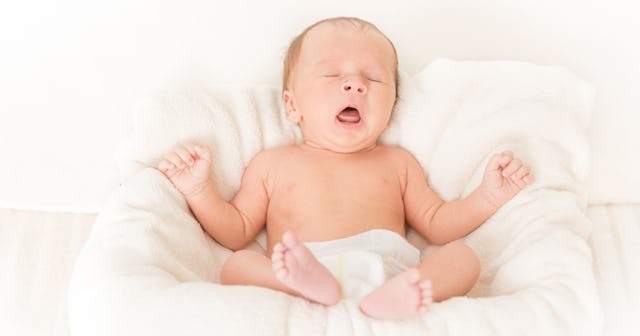Newborn Sneezing A Lot? What To Know About This Normal Baby Behavior

Moms of newborns — especially first-time moms — might be shocked by just how many weird noises those little goofballs make, especially the newborn sneezing. No, it’s not just you and your baby, and you aren’t suffering from post-delivery brain fog. Newborns do really sneeze more often than the rest of us. But it can’t be said enough; you know your baby better than anyone. If they’re running a fever or seem like their breathing is labored, call a pediatrician immediately. But in general terms, it is totally normal for newborn babies to sneeze, even at times that might not always make sense.
The Cleveland Clinic assures moms sneezing is normal for newborns, along with burping, yawning, and baby hiccups. And I think we can agree the farts or “gas bombs” (as my very Texas grandmother used to call them) are gifts, each and every one.
Reasons for Newborn Sneezing a Lot
Don’t fire up the vaporizer just yet, Captain Vicks. The reason your baby is sneezing a lot is probably not what you think.
It’s not necessarily allergies or a cold. Babies have little tiny nose holes, and they get blocked all the time. It makes sense their reaction to sneeze would be triggered more often than the rest of us. When you hear your newborn sneezing, they’re probably just clearing their nostrils. Even the tiniest dust bunny could cause a blockage and trigger a reflexive newborn sneezing party.
That’s good news! The little peanut is doing precisely what they’re supposed to. Excellent job, everyone.
Newborn Sneezing Is Supposed to Happen
“Sneezing helps to open the nose,” Tomahawk Farm Pediatrics reassures its patients, explaining newborn sneezing is about clearing the nose of irritants. “It’s usually caused by dust, fuzz, tobacco smoke, or other strong odors. If sneezing becomes frequent, use nasal washes. This is not caused by an allergy.”
Besides everyday stuff in the air, Dr. Dina Kulik explained to Today’s Parent that newborns sneeze because they have spent months floating in amniotic fluid that “certainly went up his nose.” She suggests using a few saline drops and a nasal aspirator (the sucky bulb thing) to help clear their breathing.
Making matters even worse for a newborn with a clogged nose is the fact that babies are “obligate nose breathers” who can only breathe out of their mouths when they’re crying,” according to Texas Children’s Hospital. The rest of the time, those tiny nose holes are their sole source of air. Understandably, any obstruction would trigger a newborn sneeze.
How long does it take for newborns to sneeze after birth?
Babies don’t take very long to sneeze. They usually do it a few days after they’re born, which babies do to clear their noses of amniotic fluid. You can help decongest baby faster by dripping a few saline drops in their nose or using a nasal aspirator.
When a Baby Sneeze Isn’t Normal
A baby sneeze and runny nose by themselves aren’t cause for alarm, but when is a newborn sneeze a cause for concern?
Suppose the sneeze or baby congestion appears alongside other symptoms like a fever. In that case — or the instance of decreased appetite, trouble nursing, or sleeping — the sneeze is more likely being caused by a cold. According to the Mayo Clinic, newborns under the age of 3 months should be seen by a pediatrician as soon as you suspect they have a cold.
Kids over 3 months of age should see a doctor if they aren’t wetting a usual number of diapers (which could be a sign of dehydration) or have any of the following: a fever above 100.4 degrees F, red eyes, trouble breathing, persistent cough, thick or green nasal discharge, an unusual cry, or other concerning behavior.
Johns Hopkins joins the other health professionals in reassuring caregivers of babies who are sneezing a lot that “sneezing is common in newborns.” Explains the hospital, “This is a normal reflex and isn’t due to an infection, allergies, or other problems.”
So, there it is. If newborn sneezes are giving you mama agita, please don’t worry. It isn’t because you let your husband’s college friends smoke cigars inside that one time or because you didn’t buy the boutique $8,000-a-bottle baby laundry detergent. It isn’t even due to your intense, albeit short-lived, White Barn candle addiction. Your baby is sneezing because that’s just one of those things babies do. They’re weird. And you’re still doing a great job.
OK, now you can fire up the humidifier if it makes you feel better.
Baby Sneezing Home Remedy
When a baby has a stuffy nose, the entire ordeal is hard to watch. So, if you’re looking for ways to soothe their irritated snoz, follow these tips below.
- Rub coconut oil on your child’s body before they go to bed. It will help them feel warm and give them a good night’s sleep.
- Turn on the hot water in the bathroom and let it steam up a bit. Bring your baby into the homemade steam room for about one to two minutes. This will help break down congestion.
- Double down on the breast milk. This natural product is great for fighting viruses and building a strong immune system. Giving your baby an increased dosage to help them stay hydrated and fight the cold.
- Suck out the congestion. Unfortunately, when a baby’s stuffy, they don’t know how to blow their nose yet. However, a bulb syringe can be a big help in removing their boogies. Squeeze the syringe and then place it half an inch into the baby’s nostril. Then release the bulb, so it sucks out the snot. Then take out the syringe and squeeze its contents into the garbage or a tissue.
This article was originally published on